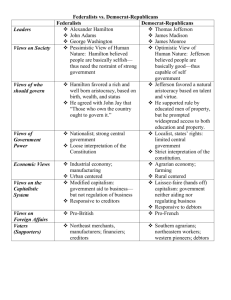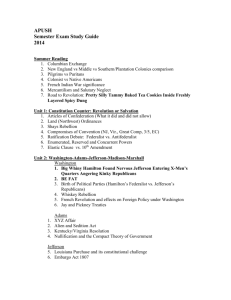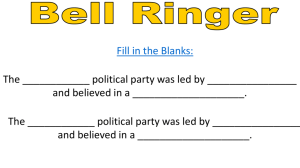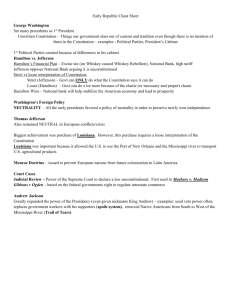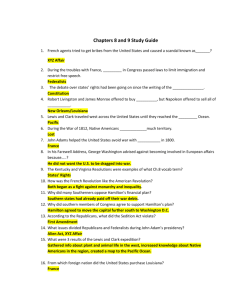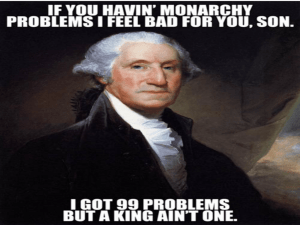Strict Interpretation vs
advertisement
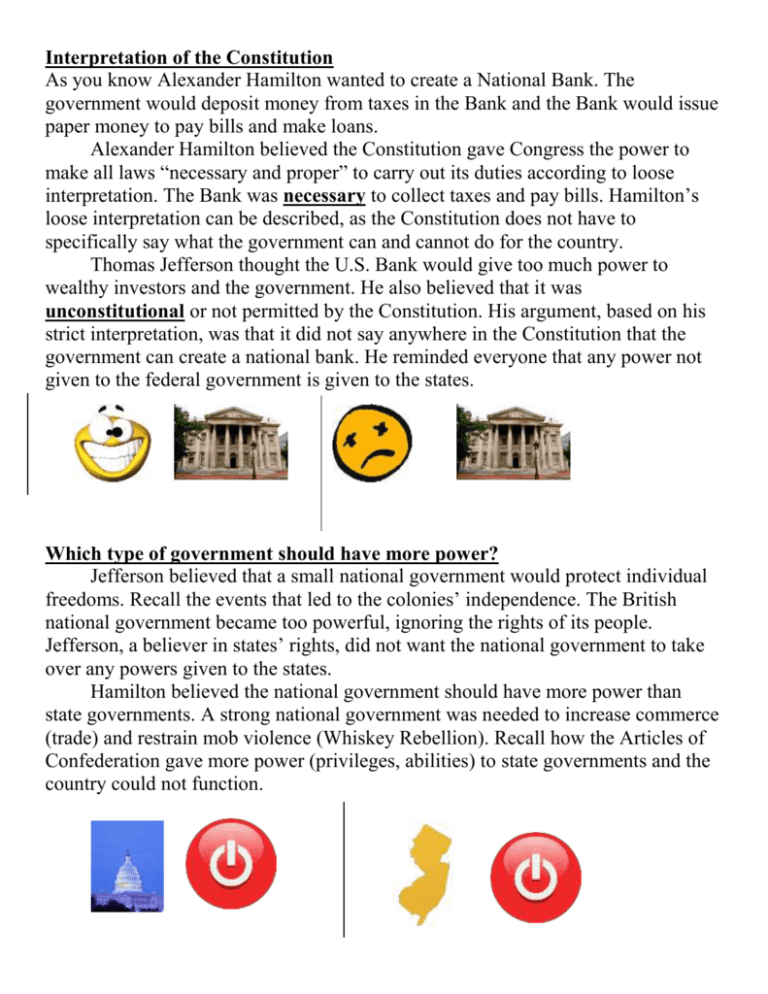
Interpretation of the Constitution As you know Alexander Hamilton wanted to create a National Bank. The government would deposit money from taxes in the Bank and the Bank would issue paper money to pay bills and make loans. Alexander Hamilton believed the Constitution gave Congress the power to make all laws “necessary and proper” to carry out its duties according to loose interpretation. The Bank was necessary to collect taxes and pay bills. Hamilton’s loose interpretation can be described, as the Constitution does not have to specifically say what the government can and cannot do for the country. Thomas Jefferson thought the U.S. Bank would give too much power to wealthy investors and the government. He also believed that it was unconstitutional or not permitted by the Constitution. His argument, based on his strict interpretation, was that it did not say anywhere in the Constitution that the government can create a national bank. He reminded everyone that any power not given to the federal government is given to the states. Which type of government should have more power? Jefferson believed that a small national government would protect individual freedoms. Recall the events that led to the colonies’ independence. The British national government became too powerful, ignoring the rights of its people. Jefferson, a believer in states’ rights, did not want the national government to take over any powers given to the states. Hamilton believed the national government should have more power than state governments. A strong national government was needed to increase commerce (trade) and restrain mob violence (Whiskey Rebellion). Recall how the Articles of Confederation gave more power (privileges, abilities) to state governments and the country could not function. The Economy should be based on... Some believed that the United States should model itself after Britain’s manufacturing/ trade economy. The key to this is that states should focus on making items themselves to help the U.S. become self-sufficient. This means that we don’t have to buy or trade for items. Additionally, according to Alexander Hamilton, if we can manufacture goods that others need and want, countries could become dependent on the U.S. increasing our profits. The Federalists and Hamilton certainly supported a manufacturing based economy. On the other hand, Jefferson felt that farmers were the backbone of the nation. He referred to them as “cultivators of the Earth”. Jefferson also believed that the U.S. would be at its strongest if it was able to produce its own food. A manufacturing economy in his mind would corrupt the U.S. by giving a small group of Americans wealth and power. Farmers can each produce their own food, focusing more on the individual. British or French? When the French Revolution began, Hamilton hoped that it would lead to the establishment of a free and good government. But as he watched it lead instead to chaos and bloodshed, his enthusiasm for the revolution cooled. When war broke out between France and England in 1793, most Federalists sided with Great Britain. Some were merchants and shippers whose business depended on trade with America’s former enemy. Other simply felt more comfortable supporting orderly Great Britain against revolutionary France. Hamilton favored Great Britain because he imagined the United States becoming a respected nation much like them. Hamilton wanted to remain close with Great Britain because they became a major trading partner. The U.S. depended on the British to buy items grown or manufactured. Jefferson’s Democratic- Republicans referred to the Federalists as “British bootlickers”, implying that they were weak and eager to please the British. Most Republicans supported the revolution in France. Jefferson favored becoming allies with the French. They were the first allies to the U.S. during the American Revolution. Their loyalty should be rewarded. Jefferson also feared that becoming too close with British, the same country they fought with for independence. Views on Human Nature: Selfish or Hopeful Jefferson’s view of human nature was much more hopeful than Hamilton. He assumed that informed citizens could make good decisions for themselves and their country. “I have so much confidence in the good sense of man,” Jefferson wrote when revolution broke out in France. Jefferson had great faith in the goodness and wisdom of people who worked the soil—farmers and planters like himself. Democratic- Republicans received support from farmers, artisans (skilled workers, i.e furniture), and some wealthy planters. Hamilton’s view of human nature was shaped by his wartime experience. All too often, he had seen people put their own interests and desire for personal profit above the cause of patriotism and the needs of the country. Most Federalists shared Hamilton’s view that people were basically selfish and out for themselves. For this reason, they distrusted any system of government that gave too much power to the common people. Federalists received support from merchants (trades or sells items made by others) and manufacturers.

